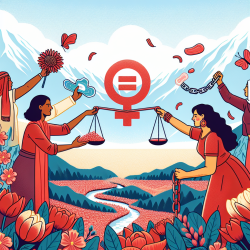The recent study titled "Menstrual restriction prevalence and association with intimate partner violence among Nepali women" sheds light on a critical issue affecting women's health and rights in Nepal. This research highlights the widespread practice of menstrual restrictions and its potential links to intimate partner violence (IPV). As practitioners in the field of women's health and rights, it is imperative to understand these dynamics to foster meaningful change.
The Prevalence of Menstrual Restrictions
In the Terai region of Nepal, menstrual restrictions are a common experience for women. The study found that nearly 72.3% of women reported experiencing high levels of menstrual restriction, involving two or more types of limitations during menstruation. These restrictions often include prohibitions on entering places of worship, cooking, or even interacting with family members. Such practices are deeply rooted in cultural norms that stigmatize menstruation.
Linking Menstrual Restrictions to Intimate Partner Violence
The study aimed to explore whether there is an association between menstrual restrictions and IPV. Interestingly, while the prevalence of menstrual restrictions was high, no significant association was found between these restrictions and IPV when controlling for demographic variables. This finding suggests that while both issues are prevalent, they may not be directly correlated in the way previously assumed.
Implications for Practitioners
For practitioners working in the field of women's rights and health, these findings offer several implications:
- Advocacy for Policy Change: The criminalization of practices like Chaupadi in Nepal is a step forward. Practitioners should advocate for policies that address all forms of menstrual restrictions.
- Community Engagement: Engaging local communities to challenge and change social norms around menstruation is crucial. Education campaigns can help dismantle stigma and empower women.
- Integration with Health Programs: Incorporating menstrual health education into existing health programs can help address both hygiene needs and social stigma.
- Further Research: More research is needed to understand the nuances of how menstrual restrictions impact women's lives and their potential links to IPV.
The Role of Global Health Initiatives
The global health community must prioritize integrating efforts to reduce menstrual stigma within existing water, sanitation, and hygiene (WASH) initiatives. By doing so, we can ensure that menstruation is safe and destigmatized, contributing to broader sustainable development goals related to health, education, gender equality, and economic opportunity.
Encouraging Further Research
This study is among the first to quantify menstrual restrictions and explore their potential associations with IPV. It highlights the need for standardized measures of menstrual restriction and further investigation into how these practices affect women's autonomy and well-being. Practitioners are encouraged to engage in or support research efforts that deepen our understanding of these issues.
To read the original research paper, please follow this link: Menstrual restriction prevalence and association with intimate partner violence among Nepali women.










